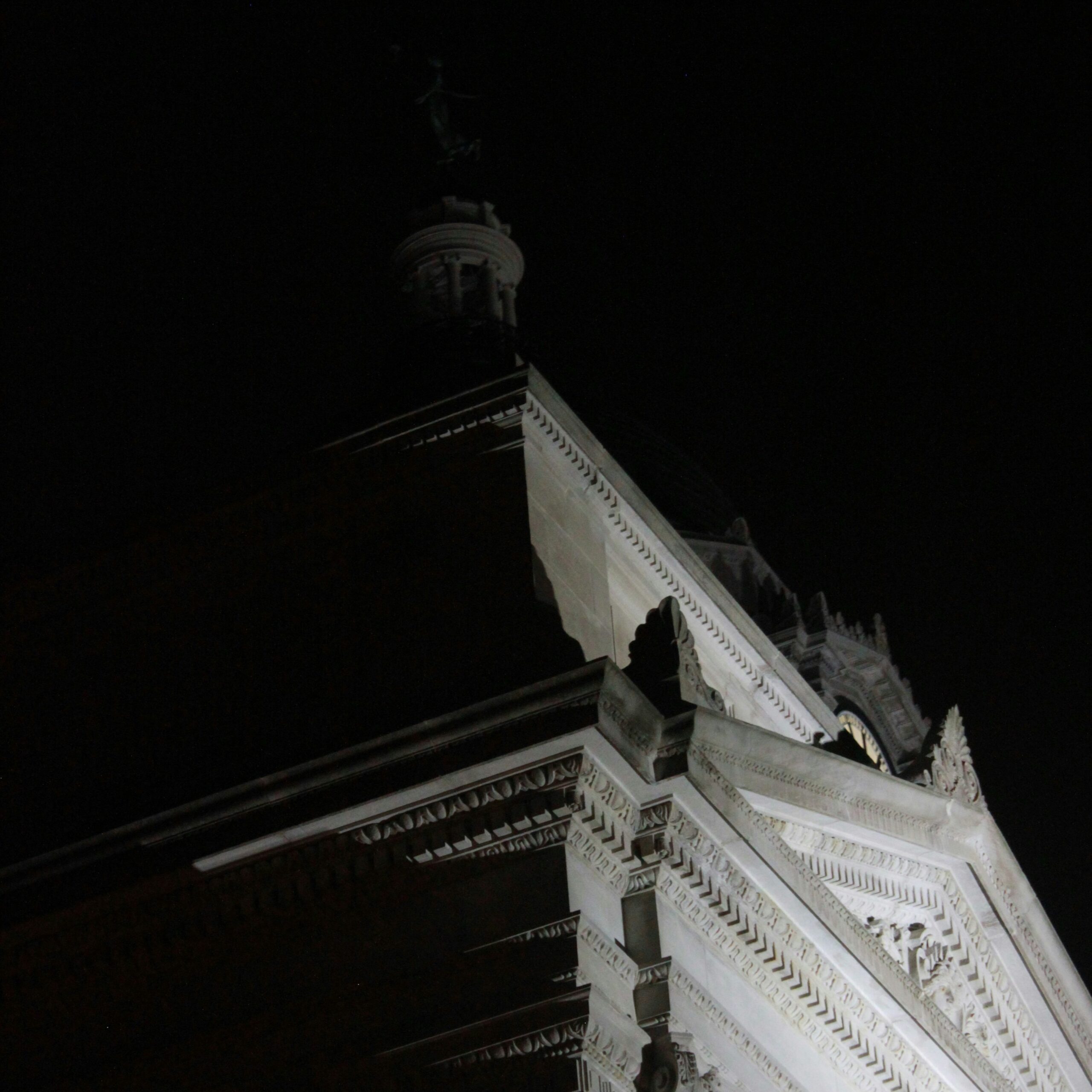The word victim is designed to slide right between your ribs. It’s a slender blade of a word, and it excels at gutting you, at hollowing you out. What it’s not designed to do is break you. It assumes you’re already broken.
The morning of the verdict, we stand across the street from the courthouse. We link hands, our fingers slipping thin through air, and cry. We don’t wail or scream; our weeping is silent, our tears dark like oil as they trail streaks down our faces.
No one sees. No one looks our way as they exit the building. First come a few curious locals, trickling out one by one. We think of drops of water. We think of blood, the wounds we wished we had been strong enough to tear in your flesh. (But what can little girls’ hands do? They know soft pink nail polish; they know sugar-dipped strawberries and Kim Possible Band-Aids. At least, they did.) Most of the locals are dull-eyed, bored, already scrolling on their phones as they walk. The press exits quickly, too, many of them with knowing smiles. The defendant was exonerated, of course. How could such an upstanding member of the community fare any differently? Several character witnesses were brought to the stand, speaking about how kind you have always been: how warm your heart, how effortless your smile.
(We were not called. Our tongues are gone.)
The jury is eager to be free, rolling their heads around on their necks as they walk, swinging their arms. One of them rolls his eyes as he whips out his phone and starts making calls. One juror is red-eyed—we think again of blood, the viscous sullen flow of it, the river we would give anything to dip our hands in—and shaking. Finally, here she is. Older than any of us were, then. (Is this why she survived?) Her long coat is open to the gentle wind, and we know, all of us and her too, that it should not be spring. It should be the depths of winter, snow spitting its bitterness from a blind white sky. Her hair is uncombed, dark with grease. Her face looks like it’s been ripped off and pinned to a wall and then wrapped back around her skull again. Her mouth is a small pink scar. Her eyes, glittering, are the only parts of her that show any life. They hold light, like flaring moons.
We can see right through to the pit of her heart: a scraped-open seed, a kernel now turning over to rot. All those emotions that she brought to the trial—the anger that has been sharpening inside her all these months, the confidence she draped over herself like a disguise, even the anticipation of joy at your conviction—have burnt away. All those feelings turned black and sour, now rotting in a landfill somewhere.
We release one another’s hands and stretch them out towards her, all four or five or seven of us. (We lose track; we mix and muddle with each other, our experiences so much the same, our memories eaten like our bodies were.)
“We believe you,” we tell her. “We believe you.” And even though our words are composed only of leaves rattling in the wind, and the crack of branches under the feet of deer, and the drone of traffic from the highway, she blinks like she understands.
Then she walks more quickly away from the courthouse. She knows who is still inside. After we lost our bodies, after our souls drifted into smoke and dust, we never dared come close to you again. The terror was too great, pulsing red through what was left of our minds. But something in this woman’s eyes—their moonflash, their glint—gives us courage. After all, we have nothing left to lose.
She didn’t see us, and you won’t, either. You saw our flesh, soft and temporary, but you’ll never see our bones. They’re gnawed down to a lunar white; even the mites and beetles have gone. Moss covers us now, growing like blankets around what’s left. Wolves’ toothmarks linger, unknowable symbols carved in our marrow like hieroglyphs. Below us, the earth murmurs, wheeling on its axis. Above us, the constellations shift.
Any moment now, when you exit the courthouse, we’ll follow you. We’ll leave this woman who refuses the title that tries to knife between her ribs. The woman who still walks home, who still lives, despite everything.
And we’ll slip into your house. We’ll drift like a bad smell through the cracks in your windows. Curl like long fingers around your bedframe. We’ll siphon nightmares into your skull, pour dread into the pits of your skin, feed you images of death until the sun rises. And when you wake, your fingernails will be gray, your stomach knotted with terror. We’ll drag our screams through your bedsheets until your face sags like a collapsed shrine; we’ll spit on the fire behind your eyes. We’ll make your heartbeat stutter at every sound you don’t recognize. We’ll make your voice a fading echo, turn your scent into the bitter tang of fear: a fatal perfume in the coming night.

